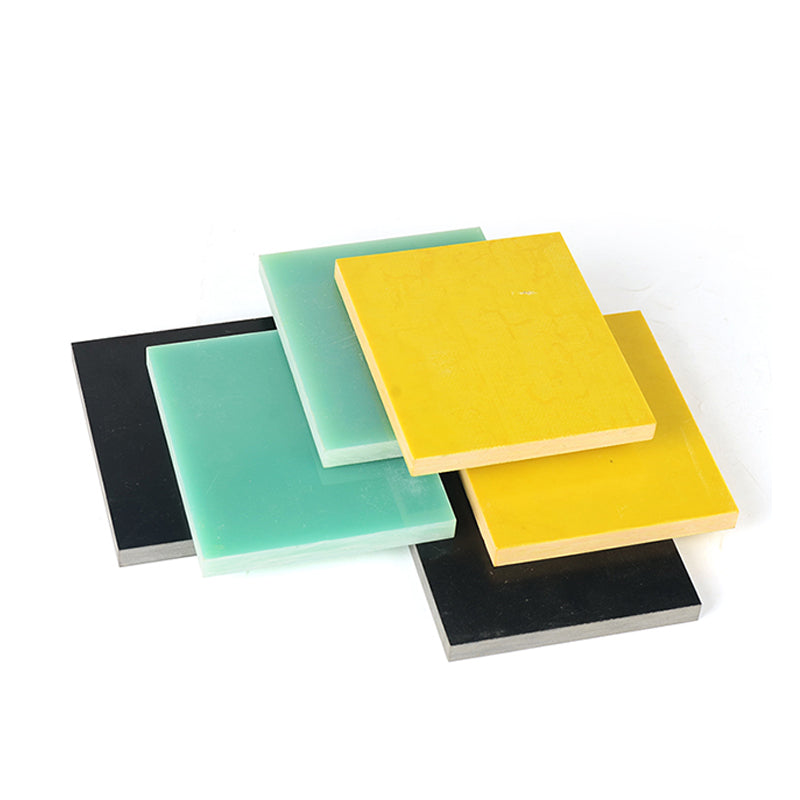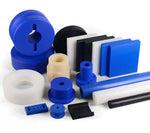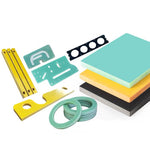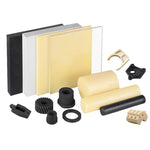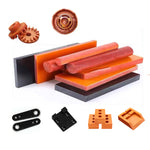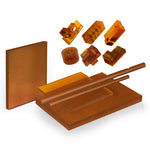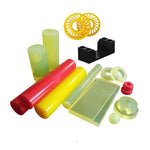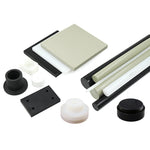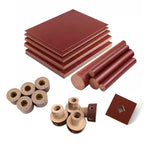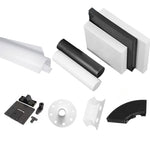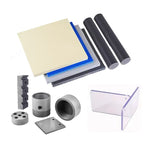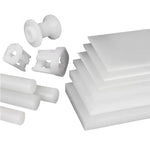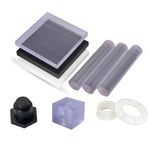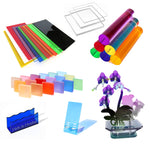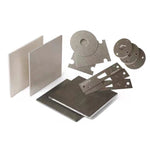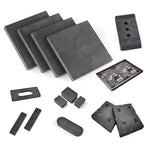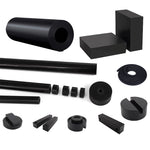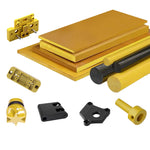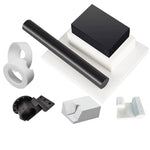Transform Your Design Into Precision Reality
Custom plastic machining with Swiss precision




PTFE(Teflon) Machining
PTFE (Polytetrafluoroethylene) Sheets, Rods & Custom Machined Components - Teflon Material Supplier
Premium Virgin PTFE, Modified PTFE & Filled PTFE Materials | CNC Machining Services | Non-Stick Fluoropolymer Solutions for Industrial Applications

What is PTFE Plastic Material? Understanding Polytetrafluoroethylene Properties & Applications
PTFE (Polytetrafluoroethylene), commonly known by the brand name Teflon®, represents the pinnacle of fluoropolymer engineering plastics. This high-performance thermoplastic fluoropolymer offers unmatched chemical resistance, the lowest coefficient of friction among solid materials, and exceptional temperature stability from cryogenic conditions to 500°F (260°C). Our PTFE plastic sheets, PTFE rods, and custom PTFE machined parts serve critical applications in chemical processing, semiconductor manufacturing, aerospace components, and industrial sealing systems.
Whether you need virgin PTFE for maximum purity, glass-filled PTFE for enhanced wear resistance, carbon-filled PTFE for electrical conductivity, or bronze-filled PTFE for improved thermal properties, BeePlastic delivers precision-manufactured PTFE components and raw materials. Our advanced CNC machining capabilities transform PTFE stock shapes into custom gaskets, seals, bearings, bushings, valve components, and specialized industrial parts with tolerances as tight as ±0.03mm.
PTFE Material Properties: Why Choose Teflon for Industrial Applications

Universal Chemical Resistance of PTFE Fluoropolymer
PTFE plastic exhibits complete inertness to virtually all industrial chemicals, acids, bases, and solvents. This fluorocarbon polymer withstands concentrated sulfuric acid, hydrochloric acid, nitric acid, and aggressive organic solvents without degradation. Only molten alkali metals and elemental fluorine at high temperatures affect PTFE, making it the ultimate chemical-resistant plastic for corrosive environments, chemical processing equipment, and laboratory applications.
- Resistant to all acids and bases except molten alkalis
- Inert to organic solvents and hydrocarbons
- Zero moisture absorption (<0.01%)
- Non-contaminating for high-purity applications
Extreme Temperature Performance of PTFE Teflon Material
Continuous service temperature from -200°C to +260°C makes PTFE ideal for cryogenic seals and high-temperature gaskets. The material maintains mechanical properties across this entire range, with a melting point of 327°C. PTFE's thermal stability exceeds most thermoplastics, providing reliable performance in thermal cycling applications, heat exchangers, and temperature-critical sealing systems.
- Cryogenic performance to -200°C without embrittlement
- Heat deflection temperature: 55°C at 0.45 MPa
- Thermal conductivity: 0.25 W/(K·M)
- Coefficient of linear thermal expansion: 100-160 × 10⁻⁶/K
Low Friction PTFE: Self-Lubricating Non-Stick Properties
With a dynamic coefficient of friction of 0.04 - the lowest among engineering plastics - PTFE eliminates stick-slip behavior in sliding applications. This self-lubricating fluoropolymer requires no external lubrication for bearings, bushings, and wear components. PTFE's non-stick surface prevents material adhesion in conveyor systems, release applications, and anti-fouling coatings.
- Static coefficient of friction: 0.04-0.10
- No stick-slip at any sliding speed
- Maintenance-free bearing material
- Release properties for mold applications
Electrical Insulation Properties of PTFE Plastic
Superior dielectric properties make PTFE the preferred insulation material for high-frequency applications, coaxial cables, and electronic components. With a dielectric constant of 2.1 and dielectric strength of 60 kV/mm, PTFE maintains consistent electrical properties across wide temperature and frequency ranges.
- Volume resistivity: >10¹⁸ Ω·cm
- Surface resistivity: >10¹⁶ Ω
- Arc resistance: >300 seconds
- Dissipation factor: 0.0002 at 1MHz
PTFE Products: Stock Shapes & Custom Machining Services

📦 PTFE Raw Materials - Sheets, Rods, Tubes In Stock
PTFE Sheet & Plate Stock
• Thickness range: 0.5mm to 100mm PTFE sheets
• Sheet sizes: 300×300mm to 1500×1500mm
• Skived PTFE film: 0.05mm to 5mm thickness
• Molded PTFE plates for maximum density
• Applications: PTFE gaskets, seals, linings, diaphragms
PTFE Rod & Bar Stock Materials
• Diameter range: 4mm to 300mm PTFE rods
• Standard lengths: 100mm to 3000mm
• Extruded PTFE rod for consistent properties
• Molded PTFE bar for heavy-duty applications
• Uses: PTFE bearings, bushings, valve seats, insulators
PTFE Tube & Roll Materials
• PTFE tubing: 2mm to 200mm diameter
• Wall thickness: 0.5mm to 20mm
• PTFE tape and film rolls
• Expanded PTFE (ePTFE) for sealing
• Applications: Pipe liners, flexible gaskets, membranes
🔧 Custom PTFE CNC Machining & Fabrication Services
Transform PTFE raw materials into precision components with our advanced machining capabilities:
- CNC Milling PTFE: Complex 3D geometries, pockets, and features
- CNC Turning PTFE: Precision bushings, sleeves, and cylindrical parts
- PTFE Drilling & Tapping: Accurate hole patterns and threads
- Water Jet Cutting PTFE: Gaskets and flat patterns without heat
- PTFE Surface Treatment: Etching for bonding applications
Specialty PTFE Grades & Filled PTFE Compounds
15-25% glass fiber for improved wear resistance and creep
25-35% carbon for conductivity and compressive strength
40-60% bronze for thermal conductivity and wear
15% graphite for self-lubrication and conductivity
PTFE Applications by Industry: Where Teflon Components Excel
⚗️ Chemical Processing Equipment
PTFE-lined pipes, valves, and tanks resist aggressive chemicals in production facilities. Custom PTFE gaskets and seals prevent leaks in flanged connections.
- PTFE valve seats and balls
- Chemical-resistant pump components
- PTFE expansion joints
- Tank linings and vessel coatings
💻 Semiconductor Manufacturing
Ultra-pure PTFE components for wafer processing equipment ensure zero contamination in cleanroom environments.
- Wafer carriers and boats
- Chemical delivery system components
- PTFE fittings and connectors
- Process chamber seals
✈️ Aerospace & Defense
High-performance PTFE seals and bearings meet stringent aerospace specifications for reliability and temperature extremes.
- Hydraulic system seals
- Fuel system components
- Wire and cable insulation
- Cryogenic sealing systems
🚗 Automotive Components
PTFE automotive parts reduce friction and wear in critical systems while resisting automotive fluids and heat.
- Transmission thrust washers
- Fuel injector seals
- Brake system components
- Electric vehicle battery gaskets
🏭 Industrial Machinery
Self-lubricating PTFE bearings and wear plates extend equipment life while reducing maintenance requirements.
- Bridge bearing pads
- Slide plates and way bearings
- Compressor piston rings
- Rotary shaft seals
🔬 Laboratory & Medical
Chemically inert PTFE labware and medical device components ensure purity and biocompatibility.
- Laboratory stirrers and vessels
- Analytical instrument components
- Medical device seals
- Diagnostic equipment parts
PTFE Technical Specifications & Material Data

Mechanical & Physical Properties
| Property | Value | Test Method |
|---|---|---|
| Density | 2.13-2.19 g/cm³ | ISO 1183 |
| Tensile Strength | 20-35 MPa | ISO 527 |
| Elongation at Break | 200-400% | ISO 527 |
| Flexural Strength | No break | ISO 178 |
| Compressive Strength | 12 MPa (1% def.) | ISO 604 |
| Hardness | 55-65 Shore D | ISO 868 |
| Impact Strength | No break | ISO 180 |
| Melting Point | 327°C | ISO 3146 |
✓ RoHS Compliance & Environmental Standards
Our PTFE materials comply with RoHS Directive (EU) 2015/863, containing no restricted substances including lead, mercury, cadmium, hexavalent chromium, PBB, PBDE, or phthalates. All materials meet environmental regulations for global markets. Material traceability and batch documentation available upon request.
Custom PTFE Machined Parts & Components We Manufacture
PTFE Seals & Gaskets
Ring gaskets, flange gaskets
Custom profiles & shapes
Envelope gaskets
Spring-energized seals
PTFE Bearings & Bushings
Plain bearings
Thrust washers
Sleeve bushings
Spherical bearings
PTFE Valve Components
Valve seats & balls
Stem packing
Valve discs
Butterfly valve seals
PTFE Wear Components
Wear strips & guides
Slide plates
Chain guides
Conveyor components
PTFE Electrical Parts
Insulators & spacers
Connector bodies
Cable wrapping
Terminal blocks
PTFE Fluid Handling
Pump components
Diaphragms
Check valve balls
Flow control parts

PTFE Processing & Manufacturing Capabilities
CNC Machining PTFE Parts
Multi-axis CNC machining centers produce complex PTFE components with ±0.03mm precision. We machine virgin PTFE, modified PTFE, and all filled PTFE grades using optimized cutting parameters to prevent deformation and achieve superior surface finish.
- 3, 4, and 5-axis CNC capabilities
- Sharp carbide tooling for clean cuts
- Controlled feed rates prevent heat buildup
Precision PTFE Cutting Services
Cut-to-size PTFE sheets, rods, and tubes using water jet cutting, band saws, and die cutting. Water jet cutting produces clean edges without heat-affected zones, ideal for PTFE gaskets and intricate shapes.
- Water jet cutting for complex patterns
- Guillotine cutting for straight edges
- Die cutting for high-volume gaskets
PTFE Turning & Boring Operations
Precision lathe work creates PTFE bushings, sleeves, and cylindrical components. Special tooling and techniques minimize material deformation while achieving tight tolerances on inside and outside diameters.
- CNC lathe turning capabilities
- Boring bars for internal features
- Threading and grooving operations
Laser Processing PTFE Film
CO2 laser cutting provides precise processing of thin PTFE films and tapes. Laser engraving creates permanent markings for part identification and traceability without compromising material properties.
- Laser cutting thin PTFE films
- Kiss-cutting adhesive-backed PTFE
- Laser marking for identification
PTFE Welding & Assembly
Specialized PTFE welding techniques join components for larger assemblies. Surface treatment including sodium etching enables bonding PTFE to metals and other materials.
- Hot gas welding for PTFE joints
- Sodium naphthalene etching
- Adhesive bonding preparation
PTFE Secondary Operations
Complete finishing services ensure PTFE parts meet exact specifications. From deburring to surface treatments, we provide comprehensive secondary processing.
- Deburring and edge breaking
- Surface polishing and finishing
- Quality inspection and measurement
PTFE vs Other Engineering Plastics: Material Selection Guide
| Material | Chemical Resistance | Max Temp (°C) | Friction Coef. | Key Advantages | Typical Applications |
|---|---|---|---|---|---|
| PTFE/Teflon | ★★★★★ Best | 260 | 0.04 | Lowest friction, universal chemical resistance | Seals, gaskets, bearings, chemical equipment |
| PEEK | ★★★★☆ Excellent | 250 | 0.35 | High strength, dimensional stability | Structural parts, medical implants |
| PVDF | ★★★★☆ Excellent | 150 | 0.14 | High purity, good mechanical properties | Pipes, pumps, chemical tanks |
| PPS | ★★★★☆ Excellent | 200 | 0.25 | Dimensional stability, flame retardant | Electrical components, pump parts |
| POM/Acetal | ★★★☆☆ Good | 100 | 0.20 | High stiffness, excellent machinability | Gears, bearings, precision parts |
| UHMW-PE | ★★★☆☆ Good | 80 | 0.10-0.20 | Impact resistance, abrasion resistance | Wear strips, guides, liners |
| Nylon/PA | ★★☆☆☆ Fair | 120 | 0.35-0.40 | High strength, wear resistance | Mechanical parts, rollers |
PTFE Quality Control & Testing

PTFE sheet flexibility and bending test

CNC machined PTFE precision components

PTFE washer in pressure gauge assembly
Quality Assurance Process
- 100% incoming material inspection
- In-process dimensional verification
- First article inspection reports (FAIR)
- Final quality control inspection
- Material certification and traceability
- Precision measuring equipment calibrated
- Statistical process control (SPC)
- RoHS compliance verification
Why Engineers Choose BeePlastic for PTFE Solutions
Precision Manufacturing
±0.03mm (±0.0012") CNC machining tolerance ensures PTFE components meet critical specifications for aerospace, semiconductor, and medical applications
Material Inventory
Extensive stock of virgin PTFE, modified PTFE, and filled PTFE grades ready for immediate processing - no minimum order requirements
Rapid Prototyping
Quick-turn PTFE prototypes in 3-5 days, production runs with flexible scheduling to meet your project timelines
Engineering Support
Technical expertise in PTFE material selection, design optimization, and cost reduction strategies for your applications
Complete Solutions
From raw PTFE materials to finished components - comprehensive manufacturing services under one roof
Global Delivery
International shipping with proper documentation, secure packaging, and reliable logistics partners worldwide
Frequently Asked Questions About PTFE Materials & Machining
What is the difference between PTFE and Teflon materials?
PTFE (Polytetrafluoroethylene) is the generic chemical name for the fluoropolymer material, while Teflon® is a registered trademark brand name. All Teflon is PTFE, but not all PTFE is branded as Teflon. The material properties and performance are identical - both offer the same chemical resistance, low friction coefficient, and temperature stability. We supply high-quality PTFE materials that meet or exceed industry standards.
How to machine PTFE plastic materials without deformation?
Machining PTFE requires specialized techniques due to its soft, flexible nature. Use sharp carbide or polycrystalline diamond (PCD) tools with positive rake angles. Maintain high cutting speeds (200-300 m/min) with light feeds to prevent material deformation. Coolants help dissipate heat and improve chip evacuation. Support thin sections to prevent flexing, and consider stress-relieving annealing for tight-tolerance parts.
What are filled PTFE compounds and their applications?
Filled PTFE compounds contain additives to enhance specific properties. Glass-filled PTFE (15-25% glass fiber) improves wear resistance and reduces creep for bearing applications. Carbon-filled PTFE (25% carbon) provides electrical conductivity and higher compressive strength. Bronze-filled PTFE (40-60% bronze) offers superior thermal conductivity for heat dissipation. Graphite-filled PTFE combines self-lubrication with moderate conductivity for dynamic seals.
Can PTFE be bonded or glued to other materials?
Virgin PTFE cannot be bonded with conventional adhesives due to its non-stick properties. However, surface treatment using sodium naphthalene etching or plasma treatment creates a bondable surface. Etched PTFE can be bonded to metals, plastics, and elastomers using epoxy, silicone, or specialized fluoropolymer adhesives. Mechanical fastening or encapsulation often provides more reliable attachment for critical applications.
What is the minimum order quantity for custom PTFE machined parts?
We accommodate orders from single prototype pieces to high-volume production runs. No minimum order quantity restrictions apply for custom PTFE machining. Whether you need one specialized PTFE gasket or thousands of precision bearings, our flexible manufacturing capabilities support your requirements. Volume pricing available for larger quantities.
How to select between virgin PTFE vs modified PTFE grades?
Virgin PTFE offers maximum chemical resistance and purity for food, pharmaceutical, and semiconductor applications. Modified PTFE provides improved mechanical properties - choose glass-filled for wear resistance, carbon-filled for electrical conductivity, or bronze-filled for thermal management. Consider operating temperature, load conditions, chemical exposure, and regulatory requirements. Contact our engineers at beeplastic@beeplastic.com for material selection guidance.
What tolerances can be achieved when machining PTFE components?
Our CNC machining achieves tolerances of ±0.03mm (±0.0012") for most PTFE components. Tighter tolerances to ±0.01mm possible for critical features with proper fixturing and temperature control. Factors affecting tolerance include part geometry, PTFE grade, feature size, and aspect ratio. Thermal expansion considerations important for tight-tolerance assemblies operating across temperature ranges.
Start Your PTFE Project Today - Get Expert Support & Competitive Pricing
From PTFE raw materials to precision-machined components, we deliver complete solutions for your industrial applications
Technical Support Email: beeplastic@beeplastic.com | Response Within 24 Hours
Explore Alternative High-Performance Engineering Plastics
Custom Plastic Fabrication
1pc to 10,000+ | ±0.03mm | No MOQ
General
HDPE
PP
PVC
ABS
Engineering
POM
Nylon
PC
PMMA
High-Performance
PEEK
PEI
PTFE
Composites
FR-4
G10
Flexible
TPU
Silicone
Why Choose BeePlastic?
Get Quote in 24h
Industries: Automotive • Medical • Food • Lab • Semiconductor
Free consultation → beeplastic@beeplastic.com
24H QUOTE DELIVERY
Upload CAD, get quote in 24 hours
NO MOQ REQUIRED
From 1 prototype to high volume
±0.03MM PRECISION
Advanced CNC with full QC inspection
1000+ TONS STOCK
26+ materials ready to ship

